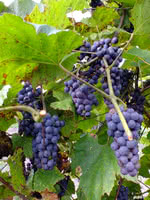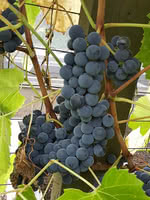Mon-Fri 9am - 5pm Mountain time
Amur Grape vs F130 Grape
Vitis amurensis
Vitis F130
NOT AVAILABLE THIS SEASON - MIGHT RETURN
NOT AVAILABLE THIS SEASON - MIGHT RETURN
The Amur Grape is an ornamental grape that fruits dark, sour, juicy grapes later in the fall. It is native to Asia, and found growing wild in Russia and China. It’s one of the most cold-hardy grape varieties, prized for its foliage that turns from a bright green to a deep crimson and purple in the fall. The flowers are small and white, usually appearing in the beginning of May.
The name for the Amur Grape comes from the Amur Valley, located in Russia. It’s extremely resistant to frost. The berries are good for fresh eating, but also make a flavorful addition to any homemade wines and preserves. The leaves are also edible, and are commonly used in salads. This plant does best with a trellis.
Note: We do not ship grape vines to BC due to regulatory restrictions from the Canadian Food Inspection Agency.
This variety is cold-hardy and will produce bluish red clusters of grapes that are great for jellies and juice. Grapes have long been used to cover arbors and trellises.
Grapes are a higher maintenance species requiring regular care and pruning. Unchecked and uncared for grapes can spread, be eaten by birds, and have lesser yields.
Applying a thick layer of mulch can help these vines overwinter better.
Note: We do not ship grape vines to BC due to regulatory restrictions from the Canadian Food Inspection Agency.

